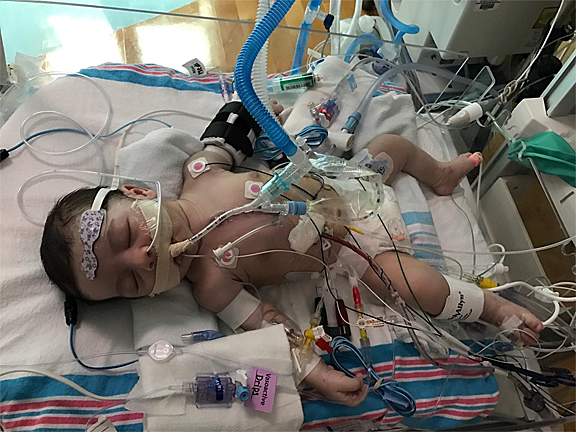Cribside Critical Care

Monitoring our tiniest patients within hospital walls and beyond.
David “Jackson” Rodes was born on April 8 to Ashley DuBois and David Rodes of Tallahassee. Already sporting a full head of dark brown hair, Jackson had a seemingly normal first 14 hours of life until a nurse noticed that he had started to turn purple. The nurse pressed on his toes and fingers and saw the pink coloring did not return – an indication that something was wrong. Jackson was rushed to the hospital’s neonatal intensive care unit, or NICU, where doctors performed an echocardiogram, a sonogram of the heart, and discovered an obstruction of blood flow.
The couple immediately had to choose between having their son taken to a hospital in Jacksonville or one in Gainesville for further care. They chose UF Health Shands Children's Hospital in Gainesville because of the facility’s reputation for taking care of children with heart defects, Ashley explained.
Within 24 hours, Jackson was airlifted to the NICU at UF Health in Gainesville. He was diagnosed with severe pulmonary valve stenosis, a variant of the same diagnosis given to comedian Jimmy Kimmel’s son, Billy, in early May. Kimmel recently spoke at length about his son’s condition on his late-night television show. In Jackson’s case, blood flow was blocked to the right ventricle pulmonary artery because of narrow valves.
“Jackson’s pulmonary valve is very small and it limits the blood flow to the lungs so that it’s almost blocked. He would eventually die if he didn’t get this fixed,” said Jennifer Co-Vu, M.D., director of the fetal cardiac program at the UF Health Congenital Heart Center.
The morning after Jackson arrived at UF Health, Curt Fudge, M.D., the director of the pediatric interventional cardiology program at the UF Health Congenital Heart Center, performed a cardiac catheterization to open the valve with a balloon mechanism. After the surgery, the baby was transported from the NICU to the pediatric cardiac intensive care unit, or PCICU, under the watchful eyes of Joseph Philip, M.D., FAAP, medical director of the PCICU, and Alan Brock, M.D., pediatric cardiology fellow, to assess the effectiveness of the surgery. Jackson’s valve was too thick and his oxygen levels continued to be a concern – remaining in the 70s when they should be in the high 90s. The physicians determined that Jackson’s best option would be to undergo an open-heart surgery. Two weeks later, Mark Bleiweis, M.D., the director of the UF Health Congenital Heart Center and the chief of congenital cardiothoracic surgery, and his team placed a shunt in the baby’s heart valve that increased the blood flow to his lungs.
One week and a day after Jackson’s surgery, Ashley and David finally were able to bring their newborn home for the first time. The parents are able to closely monitor their son’s condition through a new iPad-monitoring app customized by UF Health’s single-ventricle team. The new app is a two-way communication and engagement platform that provides patient families with a comprehensive resource during the at-home recovery period, one that helps to reduce confusion and anxiety for families during what can be an overwhelming time.
“Our team can do great things in the hospital to take great care of these children and their families, but then we have to send them home and the parents have to feel very comfortable knowing that their babies are safe,” Bleiweis said.
Although follow-up appointments will continue to alternate weekly between Tallahassee and Gainesville, Ashley and David will be able to record Jackson’s vitals in real-time on the device that will let clinicians know if something doesn’t seem right. The app is one more example of how UF Health Shands Children’s Hospital, recognized by U.S. News & World Report as one of the top 25 pediatric cardiology and heart surgery centers in the country and No. 1 in Florida, is providing innovative care to its highest-risk patients, like Jackson.
“This iPad app technology is wonderful because it gives us the opportunity to go home with them. We feel like we’re literally part of the family,” Bleiweis said.
About the author
